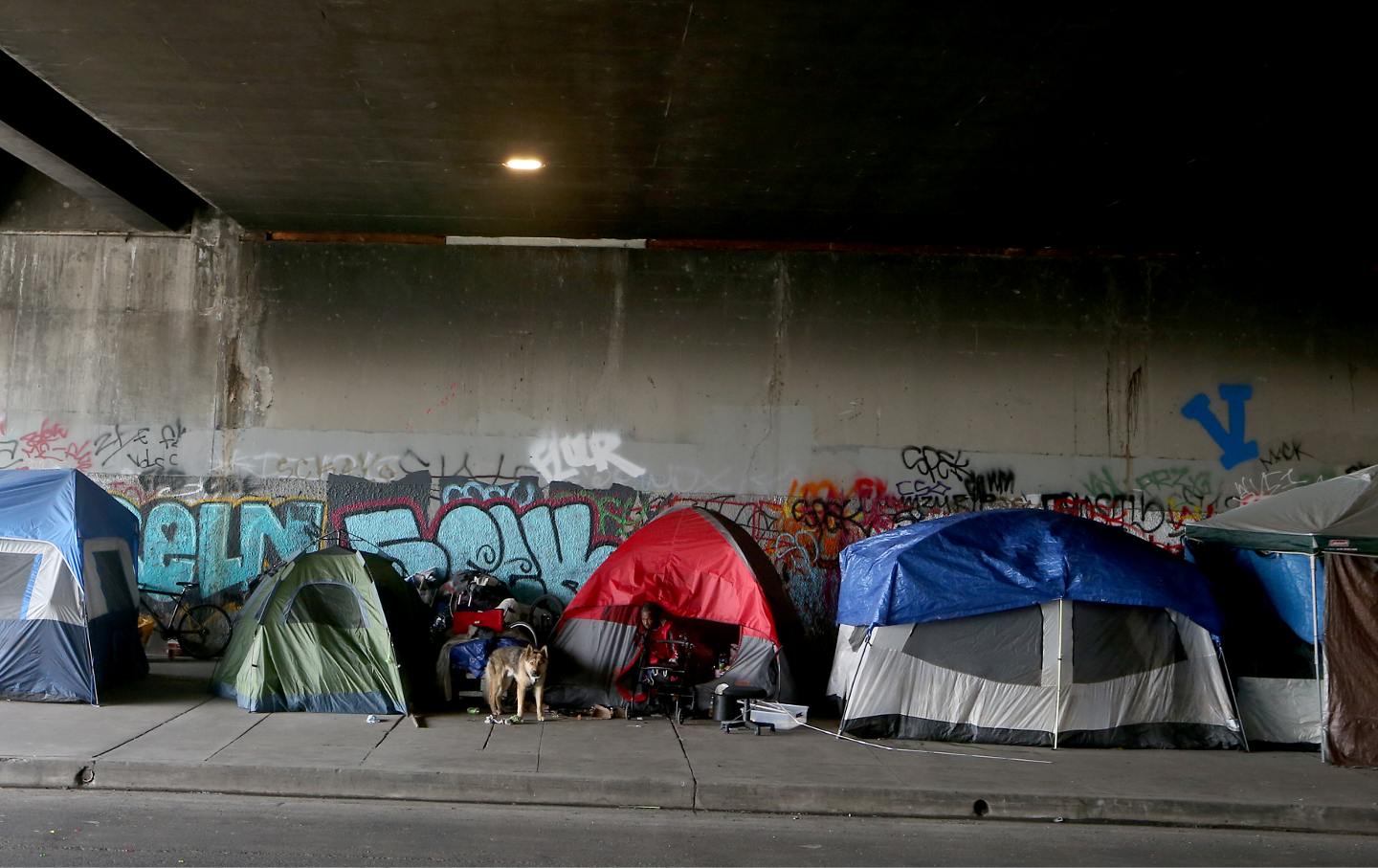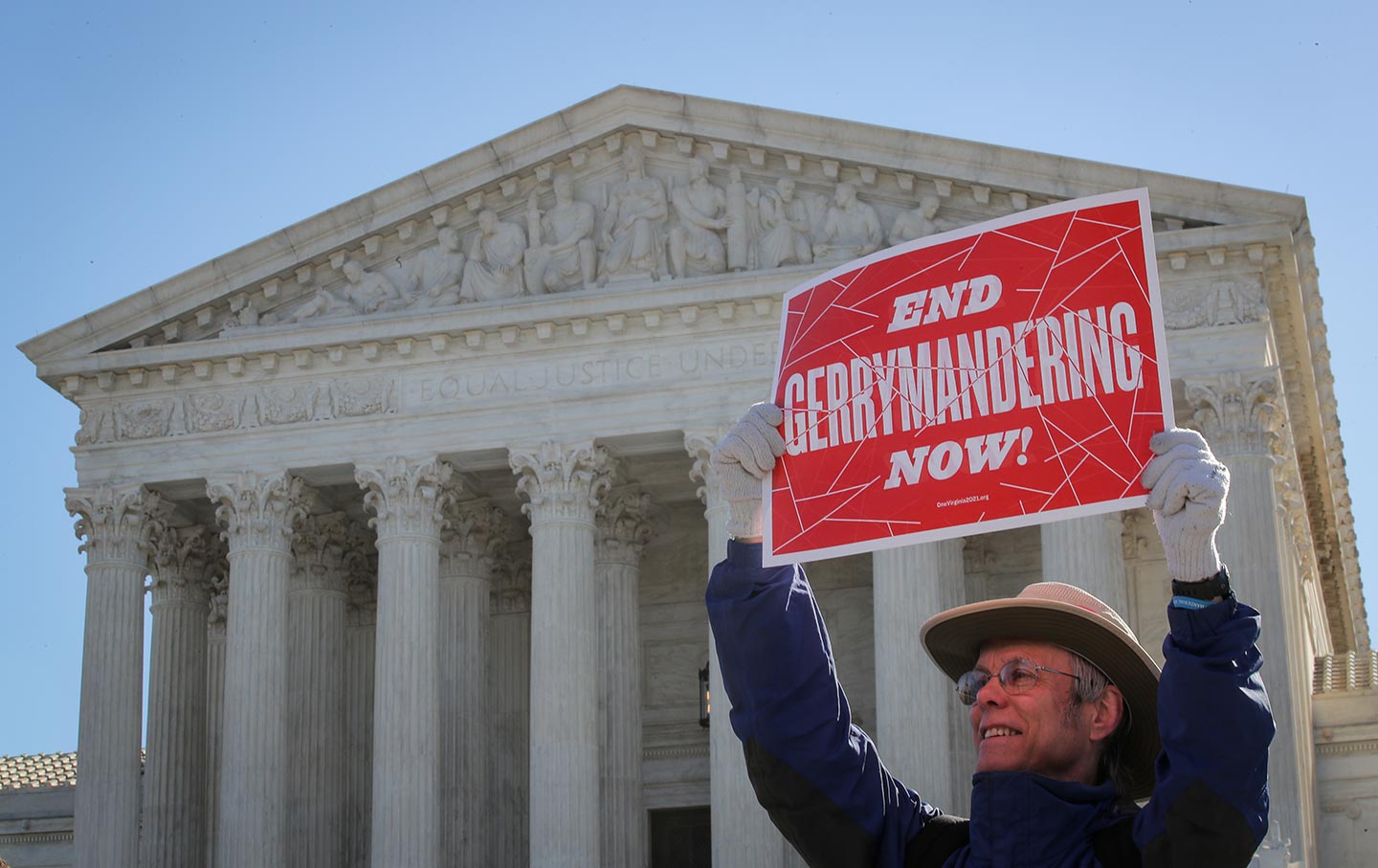Other Countries Know Housing Is a Human Right. Why Doesn’t America?
Many European countries have systems to help unhoused people that put our society to shame. When will we change?

A tent city in Culver City, Calif.
(Luis Sinco / Los Angeles Times via Getty Images)For the past several weeks, I have been traveling around Europe, visiting three countries—Denmark, the United Kingdom, and Greece—with different levels of wealth and inequality, and different political ideologies animating their governments. As someone coming from California, where homelessness and endemic on-the-street drug usage and mental illness are the backdrop to everyday life in the state’s large cities, it’s always an eye-opener to see how the rest of the world fares on this.
In the entire country of Denmark, with a population of roughly 6 million, there are, experts believe, 10,000–15,000 homeless people. Most of them, however, do not live on the streets, since, more than a decade ago, the government embraced a goal of eliminating on-the-streets homelessness by providing a range of temporary accommodations, and, at the same time, began enforcing laws against the presence of homeless encampments. Denmark’s total number of homeless is about the same as the total number in Sacramento, where I live. In Sacramento, a city of less than 600,000, the majority of these men and women do live on the streets, with precious few alternatives offered to most of them, and a lack of political will to do much more than move the encampments from one city block to the next.
In the UK, which has many of the same social inequalities and wealth disparities as the US, the advocacy group Shelter estimates that there are more than a quarter of a million homeless, which is a larger number than in California. In the UK, though, the vast majority of these individuals have access to at least temporary housing. In fact, according to Shelter’s report, while London has nearly 150,000 homeless people, the total number of on-the-streets homeless in the capital city is counted in the hundreds rather than the thousands.
Meanwhile, in the Greek capital, Athens, for the past two years the homeless population has been protected by a homeless bill of rights, which defines housing access as a fundamental human right. Thus, despite the fact that Greece is a far poorer country than the United States—and certainly far poorer than is California—one doesn’t see homeless encampments lining city streets, or huge numbers of desperately ill people wandering, untreated, through urban neighborhoods.
Don’t get me wrong. There are many things the US, including California, does very well. There are areas of life in which the world can learn from America. But when it comes to housing—and the delivery of social and medical services that might help prevent people from spiraling into homelessness in the first place—California needs to take every lesson it can from regions of the world that do a far better job at tackling systemic homelessness.
In the UK, the Conservative government, an unsavory bunch of right-wing ideologues who no one can seriously claim is some sort of radical-left cabal, has embraced the idea of expanding the supply of affordable housing—albeit in a haphazard, somewhat half-hearted way. And it has done so with grassroots support: More than half of the party’s voters support increased investments in “social housing,” or what in the US would be termed either public housing or affordable housing.
In the US, by contrast, while majorities of the public support more investments in housing, including the idea of building more shelters, that support fissures when people are whether they would support the building of shelters in their own communities. NIMBYist movements are particularly powerful in US politics. Moreover, there’s huge suspicion of defining housing as a right—even California Governor Gavin Newsom has pushed back against such proposals by liberal state legislators.
All of this helps shape a particularly cautious—and dysfunctional—approach to on-the-streets homelessness. Newsom’s administration continues to pour money into the housing crisis, with a paucity of results. No wonder California’s public is deeply pessimistic on the housing front, with 70 percent reporting that the unaffordability of housing has increased in their areas in recent years and one in three saying that the cost of putting a roof over their head could ultimately drive them out of the state.
When I talk with my friends in Europe, they always express amazement at the continued existence of shantytowns around California. America’s West Coast is, after all, something of a shining beacon—a place that, in the world imagination, people go to so as to reinvent themselves, and a place that, during the darkest days of the Trump era, stood up and proudly articulated an alternative vision of what America could be.
To be honest, by the end of these conversations I’m just as bemused as are my friends. How is it that I can walk around a city in Greece at all hours of the day and night and see just a handful of homeless individuals, whereas when I walk around any city in California, within a few minutes I have seen dozens of desperately poor men and women living in tents and cardboard shacks a stone’s throw from some of the most valuable real estate on the planet? How is it that London, this metropolis of 8 million people, has far fewer on-the-streets homeless than Sacramento, a capital city with one-16th the population? How is it that Denmark can provide so many options to those who lack permanent residences, but California stumbles from one slapdash, expensive, and generally ineffective response to the next?
It’s too easy to just throw up one’s hands and say, “Oh, but America’s problems—its inequality, its drug addiction crisis, its mental health catastrophe, its problem with released prisoners, its racial inequities—are just in a different league from that of other countries.” Yes, all of that is true, but the question still remains, how do we as a society deal with these grim realities? How do we marshal the energy—political, economic, and creative—to craft solutions to match these needs? After all, we cannot choose the reality we inherit, but we can choose how we interact with that reality.
If Athens can embrace the idea of housing as a fundamental human right, why on Earth can’t Los Angeles or San Francisco, Sacramento or San Diego? Or, for that matter, Seattle or Portland up north? It’s hardly as if Athens has more money or political clout than the major cities of the West Coast.
How wonderful it would be if, one day, I no longer had to have these conversations on my travels—if, instead of looking askance at America’s West Coast and its housing catastrophe, one day people from far afield could look westward and instead say, “What marvelous, creative, effective solutions you have crafted to end the scourge of homelessness. How brave of you to meet the moment so boldly.”
Disobey authoritarians, support The Nation
Over the past year you’ve read Nation writers like Elie Mystal, Kaveh Akbar, John Nichols, Joan Walsh, Bryce Covert, Dave Zirin, Jeet Heer, Michael T. Klare, Katha Pollitt, Amy Littlefield, Gregg Gonsalves, and Sasha Abramsky take on the Trump family’s corruption, set the record straight about Robert F. Kennedy Jr.’s catastrophic Make America Healthy Again movement, survey the fallout and human cost of the DOGE wrecking ball, anticipate the Supreme Court’s dangerous antidemocratic rulings, and amplify successful tactics of resistance on the streets and in Congress.
We publish these stories because when members of our communities are being abducted, household debt is climbing, and AI data centers are causing water and electricity shortages, we have a duty as journalists to do all we can to inform the public.
In 2026, our aim is to do more than ever before—but we need your support to make that happen.
Through December 31, a generous donor will match all donations up to $75,000. That means that your contribution will be doubled, dollar for dollar. If we hit the full match, we’ll be starting 2026 with $150,000 to invest in the stories that impact real people’s lives—the kinds of stories that billionaire-owned, corporate-backed outlets aren’t covering.
With your support, our team will publish major stories that the president and his allies won’t want you to read. We’ll cover the emerging military-tech industrial complex and matters of war, peace, and surveillance, as well as the affordability crisis, hunger, housing, healthcare, the environment, attacks on reproductive rights, and much more. At the same time, we’ll imagine alternatives to Trumpian rule and uplift efforts to create a better world, here and now.
While your gift has twice the impact, I’m asking you to support The Nation with a donation today. You’ll empower the journalists, editors, and fact-checkers best equipped to hold this authoritarian administration to account.
I hope you won’t miss this moment—donate to The Nation today.
Onward,
Katrina vanden Heuvel
Editor and publisher, The Nation
More from The Nation

The King of Deportations The King of Deportations
ICE’s illegal tactics and extreme force put immigrants in danger.

How Rob Reiner Tipped the Balance Against Donald Trump How Rob Reiner Tipped the Balance Against Donald Trump
Trump’s crude disdain for the slain filmmaker was undoubtedly rooted in the fact that Reiner so ably used his talents to help dethrone him in 2020.

The Economy Is Flatlining—and So Is Trump The Economy Is Flatlining—and So Is Trump
The president’s usual tricks are no match for a weakening jobs market and persistent inflation.

Trump’s Vile Rob Reiner Comments Show How Much He Has Debased His Office Trump’s Vile Rob Reiner Comments Show How Much He Has Debased His Office
Every day, Trump is saying and doing things that would get most elementary school children suspended.




